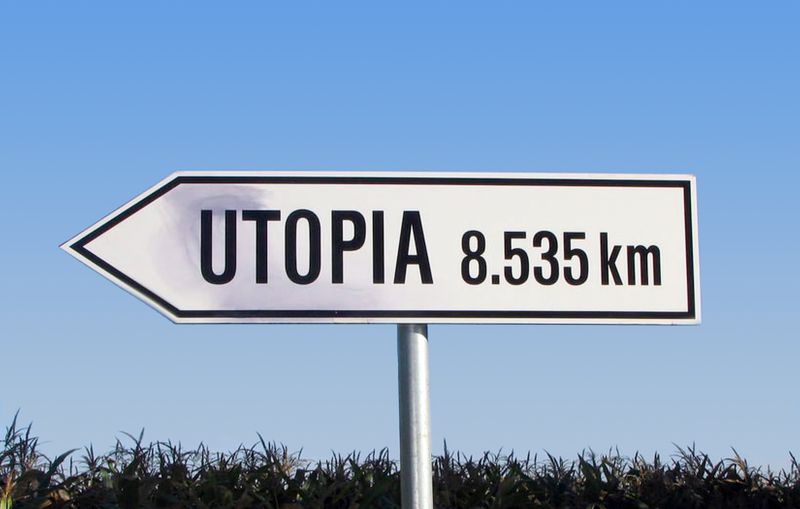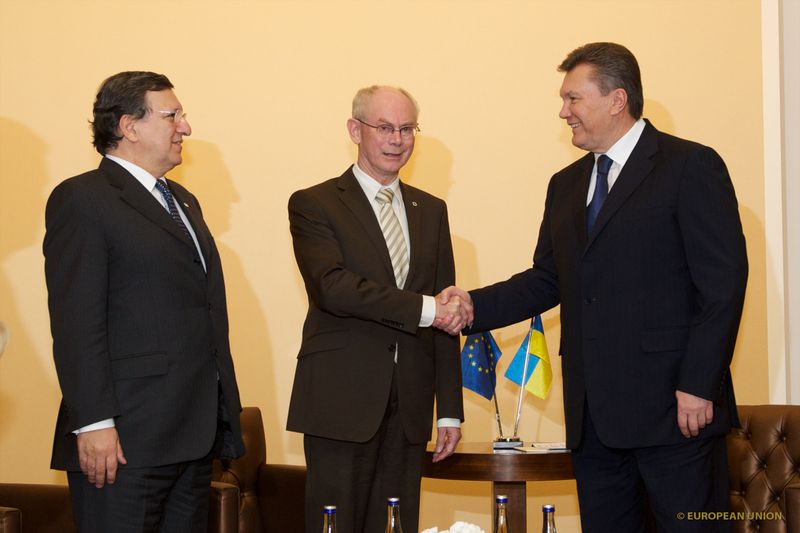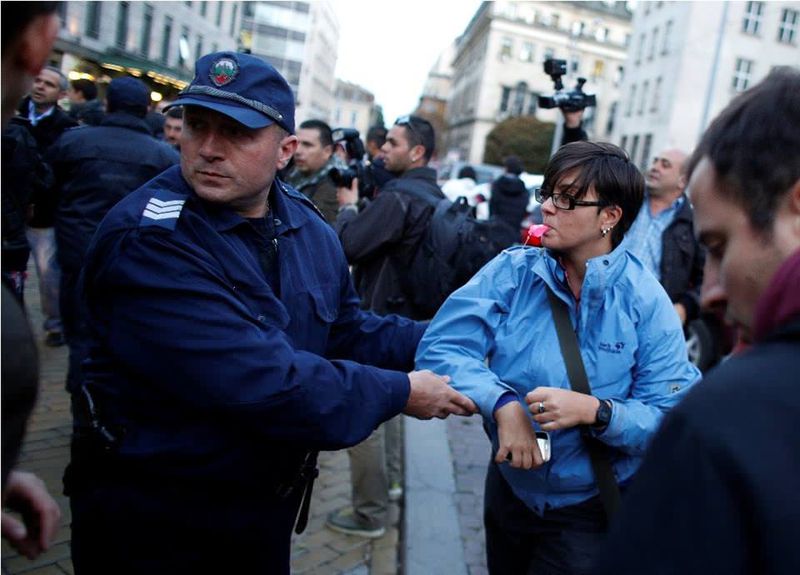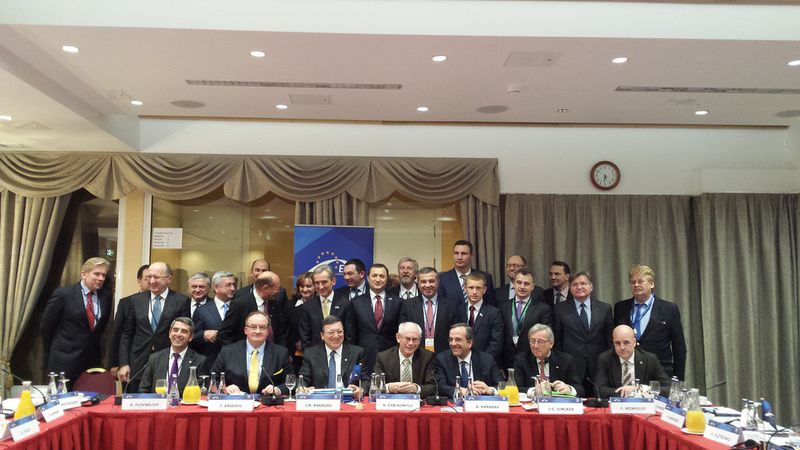Anti-Oligarchic Utopia
Adelina Marini, August 13, 2013
"Have you joined the campaign for donation of food products for Bulgaria?", I hear from the evening news programme of the Croatian national TV which has just started. For a whole week now all channels and all the first pages of the newspapers are dealing only with the emergency and unprecedented situation in Bulgaria - the hunger and the complete state chaos. Western Europe, USA, Australia and even China are donating money, clothes, food products for the now less than 5 million Bulgarians who have decided to topple the oligarchy and the Russian economic and media occupation by boycotting them. Thousands of Bulgarians have left their jobs in private companies connected directly or indirectly with the mafia, hundreds left the public administration as well, the presenter recalls with anxiety in her voice.

In the streets of Sofia and the big Bulgarian cities it is full of jobless people who are determined to get rid their country of oligarchy by depriving it of blood. When it has no one to suck from it will die after all. Farmers refuse to sell their produce to those who blackmailed them for decades and under death threats bought out their production for pennies. They sell what they have only through secretly organised exchanges to boycotters only. Just a few of the private companies that are still vital, especially from the size "small and medium", ceased to pay taxes and social contributions and refuse to buy raw materials whose origin is related even indirectly with the oligarchy and their monopolistic octopus. The shops refuse to sell food to politicians from all colours. The reserves are distributed equally only to boycotters. The selection is difficult because there are a lot of politicians or mutras (mafia guys) from the lower hierarchy levels who pretend to be boycotters. They carry themselves with teeshirts with anti-oligarchic inscriptions, but are easily recognised.
Years of invested efforts and work in personal and professional progress were thrown as a last weapon against the oligarchy's firm hand. There are no more media because all journalists have quit the newspapers, Internet outlets, TV stations and radio stations, where until recently there was some control. The state has defaulted and can no longer pay pensions and welfare, everything is falling apart.
The news programmes spend more than 15 minutes every time to follow what the situation in Bulgaria is. There is a slight increase of the migrant flow out of the country, but in general there are no huge migrant waves. This is how the live broadcast begins from the border crossing Kalotina at the Bulgarian-Serb border. Instead, I read in the newspaper, the queue of trucks, automobiles, buses, vans is over 50 kilometres long, waiting to cross into Bulgaria to bring food for the starving Bulgarians. Because of the situation and the hundreds of policemen who had quit their jobs, Frontex took over control over the borders to prevent the incursion of organised crime and smuggling inside Europe.
There are no shops left working in Bulgaria, there is no electricity almost everywhere because the workers in the former state monopolist NEC also quit their jobs. The private companies that had invested millions to build wind or solar farms provide the energy they produce for free, but there is no one to maintain the network. Here or there there are electricity enclaves to allow some link to be maintained with the outside world via the Internet and to provide foreign TV outlets with all they need to broadcast from Bulgaria. The number of journalists from all over the world is hundreds of thousands.
The greatest dilemma this week is what measures will the EU undertake. It is recalled from the TV screen that Bulgaria from the very beginning of its membership was the poorest and most corrupt of all the 28 EU member states. The European Council, the Commission and the Europarliament have suspended their famous August summer break and have been discussing together for several days now behind closed doors what solution can be found to the situation. Such a continuous meeting is unprecedented. Even when Greece collapsed there was no such thing. Unseen, in scale, humanitarian operations are being launched to save the people who dared for the first time in human history to stand against the mafia by practically calling a hunger strike.
The biggest problem is to find a painless, but relentless mechanism to build the state institutions from scratch without any connections to the past, to Russia, to the secret services. The level of suspicion, conspirativity and mistrust is without any analogue. Tests are being developed to select human resources for work, but there are still furious disputes about the criteria. People want to make sure that those who will start work in the future public institutions will not be susceptible to bribes or influence. They want to make sure that whoever governed the country will never allow monopolies, especially from Russia's part. Bulgaria's links with Moscow are practically frozen. The natural gas deliveries for Bulgaria are completely off. It is a problem that winter is approaching and it is expected to be cold.
Although there was a small wave of migrants, most people are determined to stay in their homeland to defend it from the occupier till the end. They risked all their presence to secure a mafia-free future, an oligarchy-free society, without totalitarian politicians masked as democrats, without corrupt politicians whose only purpose is to personally benefit from power and to demonstrate their superiority over the others. The unity in society is the most astounding of everything. Left or right, young or old, ugly or beautiful, smart of stupid, everyone are convinced that this can no longer continue like this and this is what makes the Bulgarian situation unique, comments a Croatian analyst in whose voice can be depicted some envy. For the first time, Bulgaria's neighbours, its European partners, the whole world would witness a complete rejection of the state so that it can be built from scratch, from square, together.
I'm packing the last box I can afford with food, clothes and books for Bulgaria and I'm in a hurry to take it on board another truck that is leaving today from the large parking lot along Zagreb's ring road. The Croats are generally very charitable and although it is a holiday season, there are serious traffic jams to the direction of the ring road. As people who have quite recently lived through a war and building their state again, although not quite from scratch, the Croats very much want to be part of the Bulgarian experiment. We are mainly eating potatoes at home because almost all our money is dedicated for aid, but these people have to win. What are several weeks or months eating potatoes only compared to living decades under oligarchy that sucks you off like Harry Potter's dementors of will for life, ambition for individual development, of love, happiness?!
Somewhere in the distance I hear the phone. It rings persistently. Is this my aunt who said she is also preparing a huge package and might want us to meet at the parking lot to load the truck together, I ask myself. The ringing is persistent, I'm looking for my phone. I find it. No one is ringing. It's my alarm clock. So, it was a dream ...
 Jose Manuel Barroso, Herman Van Rompuy, Viktor Yanukovych | © Council of the EU
Jose Manuel Barroso, Herman Van Rompuy, Viktor Yanukovych | © Council of the EU Magdalina Guenova | © Magdalina Guenova
Magdalina Guenova | © Magdalina Guenova | © EPP
| © EPP